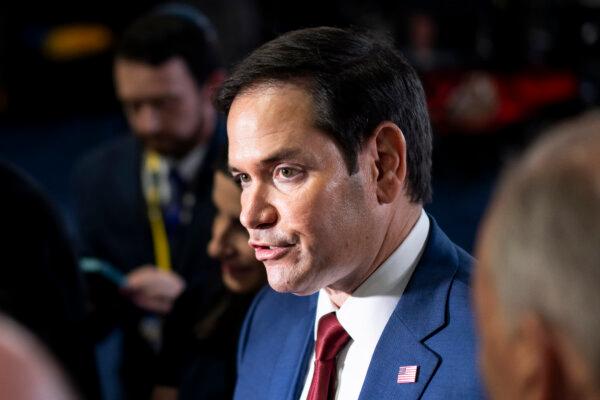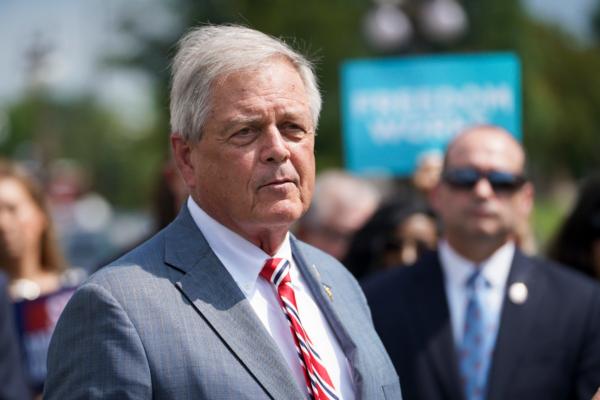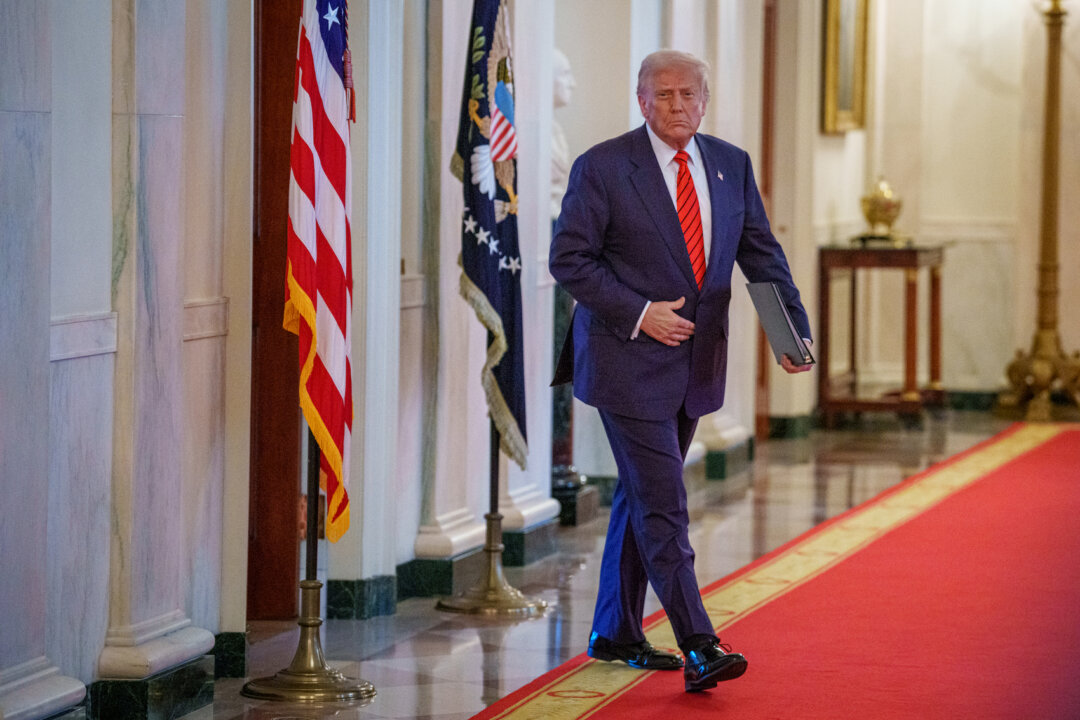Trump’s high tempo agenda won’t slow down in the coming weeks and months, according to Vice President JD Vance.
News Analysis
President Donald J. Trump has gotten off to a running start. Swift moves by his new administration have upended Washington, D.C.—including for the federal employees who dominate the capital.
One major factor is the Department of Government Efficiency (DOGE). The time-limited commission, led by Elon Musk and enmeshed in the Executive Office of the President, has trained its gaze on everything from the Commerce Department to the Federal Aviation Administration with the goal of making government leaner and more effective, drawing pushback and accusations of illegality.
DOGE’s access to Treasury payment system data spurred Democrats to try to enter the Treasury Building on Feb. 4, along with a lawsuit from federal employee unions. Democrats’ and unions’ Feb. 5 demonstration outside the Labor Department, which Musk planned on visiting that day, came alongside a similar lawsuit by labor groups to bar DOGE from obtaining that department’s data.
Massive changes at the foreign aid agency USAID, now administered by Secretary of State Marco Rubio, and which Musk said Trump wishes to shut down, triggered a protest outside that agency earlier in the week.
In a Feb. 5 letter to White House Chief of Staff Susie Wiles, Senate Intelligence Committee Democrats and committee member Sen. Angus King (I-Maine) voiced concerns over DOGE’s reported access to data from USAID, the Treasury Department, and the Office of Personnel Management.
DOGE’s doings square with the White House’s buyout offer to 2 million federal employees, including the Central Intelligence Agency (CIA), now led by Trump pick John Ratcliffe. A related executive order would cancel collective bargaining agreements that government unions negotiated shortly before Trump took office.
The president has also floated eliminating the Department of Education, which has 4,400 employees, and the Federal Emergency Management Agency, which employs over 20,000 people.
In the first weeks of Trump’s term, more than a dozen inspectors general were fired, as were Justice Department employees involved in former Special Counsel Jack Smith’s Jan. 6 investigation—the latter move coming after the president pardoned or commuted the sentences of roughly 1,500 individuals connected with the U.S. Capitol breach that took place on Jan. 6, 2021.
The Justice Department is now scrutinizing FBI agents connected to Jan. 6 investigations, driving speculation about mass firings. Acting FBI Director Emil Bove has told agents that those among them “who simply followed orders and carried out their duties in an ethical manner” will not face termination.
The president has also stripped security clearances from John Bolton and from intelligence officials who, ahead of the 2020 election, dismissed emails from Hunter Biden’s laptop as having “all the classic earmarks of a Russian information operation.” All of those individuals were subsequently barred from entering secure federal facilities unescorted.
In addition, Bolton, former Secretary of State Mike Pompeo, Pompeo aide Brian Hook, and Dr. Anthony Fauci all lost government-funded security details.
Trump also fired the head of the Consumer Financial Protection Bureau, naming Treasury Secretary Scott Bessent as its acting director—and commissioners with the National Labor Relations Board and the Equal Employment Opportunity Commission have been let go, breaking with precedent. The New York Times has reported that over 1,000 Environmental Protection Agency workers were told they could soon be fired.
Trump’s actions against diversity, equity, and inclusion (DEI) also bear on federal agencies with big footprints in D.C. One executive order targets federal DEI offices and positions, while another also encompasses DEI in the private sector. Republican legislators have sought to backstop Trump’s orders with a new bill, the “Dismantle DEI Act.”
Foreign Policy and Beyond
Trump’s policies have been no less dramatic on other fronts.
His pre-inauguration talk of potentially absorbing Greenland, Canada, and the Panama Canal set the stage for sweeping moves on foreign policy, including tariff stand-offs with Canada, Mexico, and Colombia that resulted in the president pausing trade restrictions after negotiating concessions from those countries in the Western Hemisphere.
China, meanwhile, has countered Trump’s new tariffs with tariffs of its own.
While on his tour of Central America on Feb. 3, Rubio welcomed Panama’s decision not to renew its involvement in China’s Belt and Road Initiative.

The secretary of state told Megyn Kelly on Jan. 30 that talk of acquiring Greenland amid opposition from its current owner, Denmark, is “not a joke.”
On Feb. 3, the leader of the North Atlantic Treaty Organization (NATO), which includes Denmark, fell short of condemning any talk of Greenland changing hands.
“President Trump alerted us to the fact that when it comes to the High North, there is a geopolitical and strategic issue at stake,” NATO Secretary General Mark Rutte said on Feb. 3.
“It has to do with Sweden, Norway, Iceland, yes, Greenland—and therefore Denmark—also Canada, and also the US. And clearly, collectively as an alliance, we will always look at the best way to make sure that we can tackle those challenges,” he added.
On Feb. 4, Trump proposed that the United States take over the Gaza Strip and resettle the Palestinians now living there, drawing opposition from many international leaders.

Trump has deployed troops to the U.S. southern border and deputized the Texas National Guard for immigration enforcement. Immigration and Customs Enforcement arrests have surged, though not yet to the quota of 1,200 to 1,500 per day reported by the Washington Post. CBS has reported that some arrestees have been released as detention facilities surge past 100 percent occupancy.
Huge moves in Trump 2.0 are so numerous and far-reaching that it is difficult to list them all.
A Trump executive order seeks to declassify files relating to the assassinations of President John F. Kennedy, Robert F. Kennedy, Jr., and Dr. Martin Luther King, Jr.; another ordered the creation of a U.S. sovereign wealth fund. The Federal Communications Commission released the full transcript of an interview with then-Vice President Kamala Harris; meanwhile, as the White House opens up presidential briefings to new media, the Pentagon has removed the New York Times and other sources from their office space, debuting a plan to cycle through different outlets on a yearly basis.
Trump has even renamed the Gulf of Mexico, dubbing it the Gulf of America; Google has suggested it will do the same for U.S. users of Google Maps.
Can Trump and his team sustain the high tempo?
In an interview with Breitbart released on Feb. 4, Vice President JD Vance described his administration’s current speed as “breakneck.” He said it would not slow down as the weeks and months roll by.
“I think the pace is going to be the same, it’s just the priorities are going to change,” Vance said.
Lawmakers Rank Trump’s Rapid-Fire Actions
At a Feb. 4 protest outside the Treasury Building, Rep. Bill Foster (D-Ill.) told The Epoch Times that DOGE workers’ access to Treasury payment data—the spark that lit the fire of that specific protest—was the biggest challenge he has spotted in the whirlwind of early activity.
The issue holds special significance for him as a member of the Financial Services Committee, where he is the ranking member on a key banking subcommittee.
“It’s not only about the business impact—it’s about the privacy impact,” Foster said.

Rep. Ayanna Pressley (D-Mass.), who was also at the protest, told The Epoch Times she is most concerned about Trump’s anti-DEI push, which is now reshaping the Pentagon and other agencies.
“This is a matter of our GDP. Diversity, equity, and inclusion is good business,” she told The Epoch Times. “Diversity, equity, and inclusion is legal. Discrimination is not.”
Outside the Department of Labor on Feb. 5, where he was participating in another DOGE-related protest, Rep. Glenn Ivey (D-Md.) could not name a single Trump undertaking that topped the list of what he sees as challenges.
“There’s a lot of those,” he told The Epoch Times. “The point is, we need to make sure we force the Trump administration to follow the law and follow the Constitution.”
While many Democrats and their allies try to stop or undo the big changes afoot, many Republicans are rejoicing.

Rep. Ralph Norman (R-S.C.) lauded Trump’s tariff and DEI measures but pinpointed personnel as the biggest win.
“The most impactful action he has taken is hiring competent individuals to run head the various agencies, particularly the FBI, AG, and Secretary of State,” Norman told The Epoch Times in a text message.
The Senate has confirmed Trump’s choices for secretary of state and attorney general, Marco Rubio and Pam Bondi, respectively. Kash Patel, Trump’s FBI director nominee, still awaits a vote in the Senate Judiciary Committee before he can move closer to confirmation. Bove, the agency’s acting director, defended Trump against hush money allegations from Stormy Daniels in a 2024 New York criminal case.
During a Feb. 5 press conference, House Speaker Mike Johnson (R-La.) rejected the idea that Trump’s rapid-fire actions, which include possibly scrapping the Department of Education, usurp power that should remain with the legislature.
“The executive branch of government in our system has the right to evaluate how executive branch agencies are operating,” Johnson said, adding that the start of Trump’s administration was marked by an “active, engaged, committed executive” who has significant discretion under the Constitution.
“It looks radical. It’s not. I call it stewardship,” Johnson added.
Arjun Singh contributed to this report.

